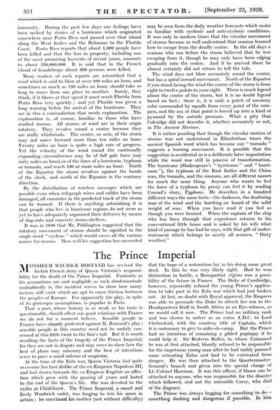The Prince Imperial Tjt ONSIEUR MAURICE ROSTAND has revived the
foolish French story of Queen Victoria's responsi- bility for the death of the Prince Imperial. Fantastic as his accusations are and negligible as such rhodomontade undoubtedly is, the incident , serves to show how. many factors still exist which are apt to cause friction between the peoples of Europe. For apparently the play, in spite of its grotesque assumptions, is popular in Paris.
. That a _poet, whose history is as weak as his taste is questionable, should affect our good relations with France we do not for a moment believe. Sensible people in France have already protested against M..Rostand's play : sensible people in this country need not be unduly con- cerned at this little twist to the lien's. tail. But it is worth recalling the facts of the tragedy of the Prince Imperial, for they are not in dispute and may serve to show how the best of plans may miscarry and the best of intentions serve to pave a small inferno of suspicion.
At the time of the Zulu war, Queen Victoria had quite overcome her first dislike of the ex-Emperor Napoleon III, and had shown towards the ex-Empress Eugenie an affec- tion which grew with the passing of years and lasted to the end- of the Queen's life. she was devoted to the- exiles at .Chislehurst. The Prince Imperial, a smart and lively Woolwich cadet, was longing to win his spurs, in action ; he convinced his mother (not without difficulty) that the hope of a restoration lay in his doing some great deed. In this he was very likely right. Had he won distinction in battle, a Bonapartist regime was a possi- bility of the future in France. The Duke of Cambridge, however, repeatedly refused the young Prince's applica- tion to take part in the Zulu war which had just broken out. At last, no doubt with Royal approval, the Empress was able to persuade the Duke to attach her son to the Headquarters Staff, in South Africa as an Eye-witness, as we would call it now. The Prince had no military rank and was shown in orders as an extra A.D.C. to Lord Chelmsford, with tire courtesy title of Captain, which it is customary to give to aides-de-camp. But the Prince had no intention of remaining a gilded popinjay if he could help it. Sir Redvers Buller, to whose Command he was at first attached, bluntly refused to be responsible for the impetuous young man after he had rashly pursued some retreating Zulus and had to be extricated from danger. He was then attached to the Quartermaster- General's branch and given into the special charge of Lt.:Colonel Harrison. It was this officer, if blame can be attached to anyone, who Was 'responsible for the disaster which followed, and not the miserable Carey, who died of the disgrace. The Prince Was always begging for sornething to do— something dashing and dangerous. if possible. In binl, this was understandable and creditable. But Harrison was vieak enough to allow him to take part in a reconnaissance to choose a camping ground for a column—an idiotic mission for such a boy, even if he had not been the Prince Imperial. Lieutenant Jahleel Brenton Carey was in command of the party, which consisted of six British cavalrymen and six Basutos.
There was some doubt in Carey's mind as to who was in command of this reconnaissance, because the Prince appeared to assume that his honorary rank of Captain made him the senior officer. No doubt Carey should have been firm on the matter. It is easy to be wise after the event. What happened has often been told, but in the helter-skelter of loosely saddled horses and exultant savages when the kraal in which they were resting was attacked, the exact fate of the Prince is uncertain. Either his horse bolted and he ran for his life, turning at last to sell his life dearly to the pursuers, or he half mounted and was carried some fifty yards on horseback, when his girth slipped or broke and he was speared. In any case, all his wounds were in front. The whole disaster was a matter of minutes. Carey was arrested, court martialled and condemned to be shot Yet he was more sinned against than Sinning. The Empress Eugenic went herself to Queen Victoria to plead for him. The sentence was reduced to that of being cashiered, and on the same day the Judge Advocate- General quashed the proceedings on the ground that the findings were not sustained on the evidence. Carey, however, was a broken man and died soon afterwards at Karachi, shunned not only by his regiment, but the whole Army.
The Duke of Cambridge issued an Army Order on the subject and the Queen was distracted with grief, as her letters show. Carey's conduct was perhaps un- fortunate and Colonel Harrison's still more so, but when young men go to war (especially such fine young men as the Prince Imperial) they must take risks, and the suggestion of collusion between the Crown. Of England and anti-Bonapartists in France is so ridiculous that no one need take M. Rostand's diatribes seriously either here or, indeed, in France. What is interesting is that such a play should be applauded.







































 Previous page
Previous page